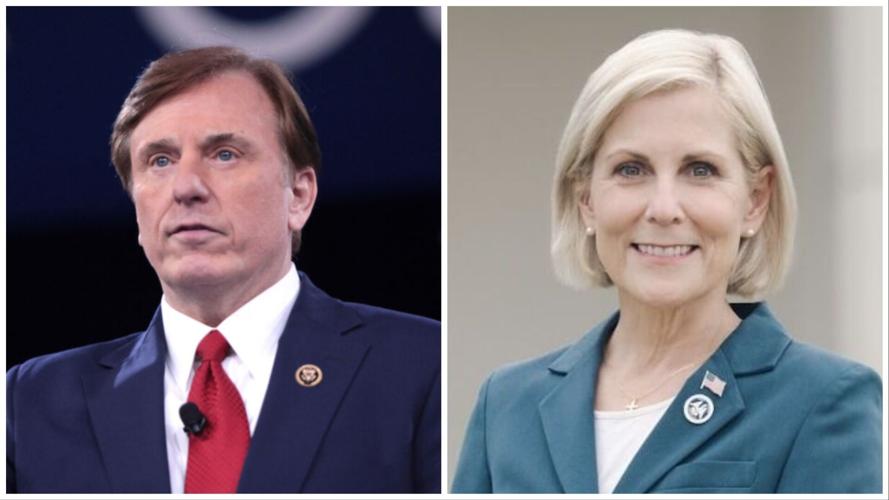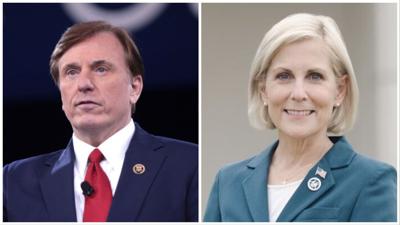Republicans tightened their hold over state government Saturday when party candidates walked away with wins in the treasurer and secretary of state races.
The results, coupled with Republican Liz Murrill’s win in the attorney general’s race, mean not a single Democrat will hold statewide office come January, when Democratic incumbent Gov. John Bel Edwards will pass the torch to Republican Gov.-elect Jeff Landry.
In a state where Democrats have a long history of being a powerful political force — even after the party lost traction in other parts of the South — the outcome of this year’s election appears to solidify Louisiana’s move to the right.
In the runoff for secretary of state, Republican Nancy Landry, Louisiana’s current first assistant secretary of state, held a commanding lead over Democrat Gwen Collins-Greenup, an attorney who also ran in 2018 and 2019, according to preliminary results released Saturday evening.
“I am grateful to the voters of Louisiana for the trust they have placed in me … My message of competent, conservative experience resonated with voters across our state," Landry said in a statement issued through a spokesperson. "I look forward to getting to work right away to make Louisiana No. 1 in election integrity."
The secretary of state’s office oversees Louisiana’s elections and manages its business registry.

"Gwen" Collins-Greenup
“Even though the results are not what we would have liked to see, I am excited and elated to see that we will now have two females in our attorney general’s office and our secretary of state’s office," Collins-Greenup said when reached for comment on election night. "While it wasn’t a victory for me personally, it’s a victory for all of the women across the state of Louisiana.”
Meanwhile, in the contest for state treasurer, John Fleming, a former Republican U.S. representative who also served as deputy chief of staff to President Donald Trump, handily defeated Democrat Dustin Granger, a financial adviser from Lake Charles and political newcomer.
Fleming said he was excited to be elected to office at "a time that is unique in the history of Louisiana." He described the incoming state government as more "pro-economic development" than ever before.
"We have I think the recipe that will be well-positioned to, with the support of the people of Louisiana, finally solve many of the problems that we’ve had in Louisiana for many, many decades," Fleming said.
The treasurer’s race grew heated in recent weeks as Granger released a series of attack ads against Fleming, and the two candidates sparred with one another through comments to the media.
In a statement issued through a spokesperson, Granger thanked his supporters and said he was proud of his campaign.
"People are the heart of our economy, and I'm not done fighting for our communities and our home," he said. "I wish John Fleming the best and hope he puts the incredible people of this state first."

Dustin Granger
The races’ outcomes seem unlikely to herald drastic changes for the offices in question.
Landry served as second-in-command to incumbent Secretary of State Kyle Ardoin for four years and announced her candidacy only after Ardoin said he would not seek reelection.
She has defended the integrity of Louisiana’s election system amid unfounded claims that widespread voter fraud influenced the 2020 presidential election.
Landry’s biggest challenge will likely involve replacing the state’s outdated voting machines. She has said she supports buying machines that count ballots electronically but also have an auditable paper trail.
As for Fleming, he has expressed support for policies incumbent Treasurer John Schroder enacted.
Though the office rarely makes headlines, Schroder, who also made an unsuccessful bid for governor, came into the national spotlight last year when he divested nearly $800 million in state funds from the financial firm BlackRock Inc., blaming its environmental, social and governance investment policies.
ESG policies require investors to take climate change and other social factors into account. Schroder argued they harm oil and gas states.
Fleming has said he believes Schroder’s decision protected Louisiana taxpayers from politically motivated investments.
Granger, his opponent, took the opposite stance, arguing that discounting investments based solely on ESG policies could cause the state to miss out on good opportunities.






